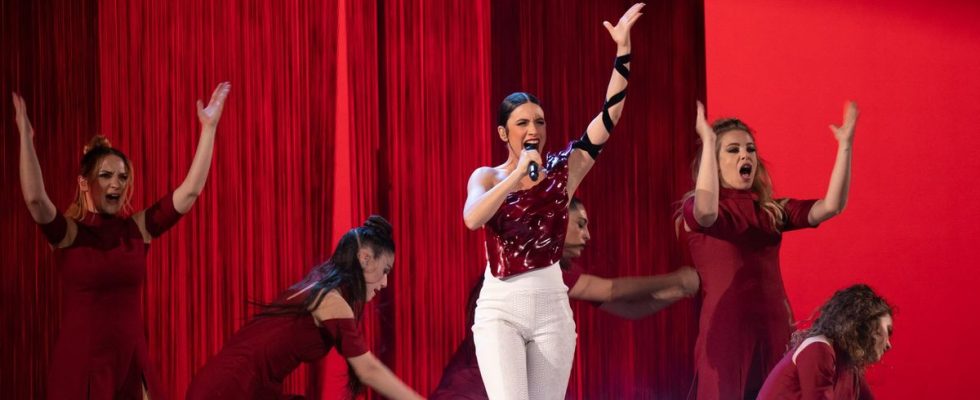From our special correspondent in Liverpool (UK)
Three spellbinding minutes. This is what Blanca Paloma will offer in the Eurovision final on Saturday evening in Liverpool. “We wanted to create a mysterious atmosphere, of ritual, of catharsis”, explains the Spaniard to 20 minutes. His song Eaeais a tribute to his grandmother Carmen.
The scarlet fringes floating above the stage are “the most important” of the scenography. They symbolize the threads of the shawl that her grandmother wore on her shoulders. “It’s as if she gave me a hug and welcomed me into a space where I feel protected,” continues Blanca Paloma. At the beginning of the performance, you see my fragility and, as you go along, you see me gain in confidence, in courage. »
Also, his passage on stage, inspired by the aesthetics of Carlos Saura’s films “who knew how to highlight Spanish culture”, has a mystical allure. “The idea is to invoke our ancestors, especially women, to bring their message to the present, include it in music, in art, and pass it on to future generations by reminding them of the heritage of those who have preceded. Thanks to their struggles, we are freer, we have more rights, it’s a way of honoring them,” adds the 33-year-old artist.
“It’s a song that I consider necessary”
“My child when I die, they bury me on the Moon and every night I will see you. (…) Ah, my child, my little child, child of my loves, may all the nights illuminate me with your sunny eyes”, she sings in this nursery rhyme which mixes flamenco with more electro, contemporary sounds, which give the whole strength and strangeness.
“These are ingredients that I identify with, as well as the Spaniards and, I hope, also the Europeans. It’s a song that I consider necessary because it is a way of expressing our roots. It is different and risky,” says Blanca Paloma.
She knows that her song is not for the general public and does not necessarily fall within the canons of Eurovision. But it is in line with a Salvador Sobral, the Portuguese winner in 2017, or a Barbara Pravi, who offered France a second place in the competition in 2021. “The presence of artists not mainstream is important for the diversity of the competition, she stresses. It would have to insist other artists in these registers to present themselves. »
“I may have something to bring to Eurovision”
The twenty-something finds herself in Liverpool after winning the Benidorm Festival in early February, Spain’s national selection for Eurovision. She had already taken part last year, and finished fifth with Water Segreto. “It was not me who had made the approach to go there. I was called,” she says. His atmospheric song was the credits to a hit documentary series Lucia in the telaraña.
“When life offers me such an opportunity, I like to reflect on it, telling myself that I may have something to learn from this experience. I think I may also have something to contribute to Eurovision, to music, that’s why I applied for Benidorm with Eaea. It’s a song that represents who I am, as a woman and an artist. »
Victory, she admits thinking about it, “necessarily”. But Blanca Paloma is preparing “for all scenarios”. “I never imagined being an artist”, slips the one who, as a child, had “no playroom, but a music room with cassettes and vinyls”. “The music called me and here I am,” she smiles. As if everything was written and that, from up there, a lucky star was watching over his destiny.

